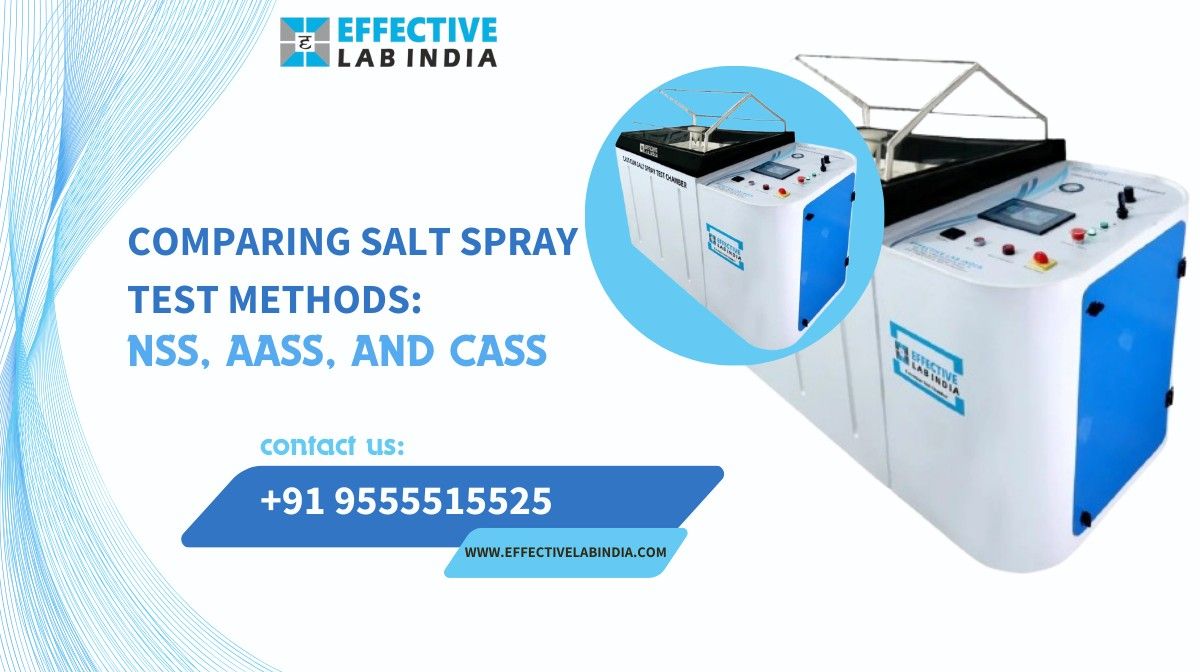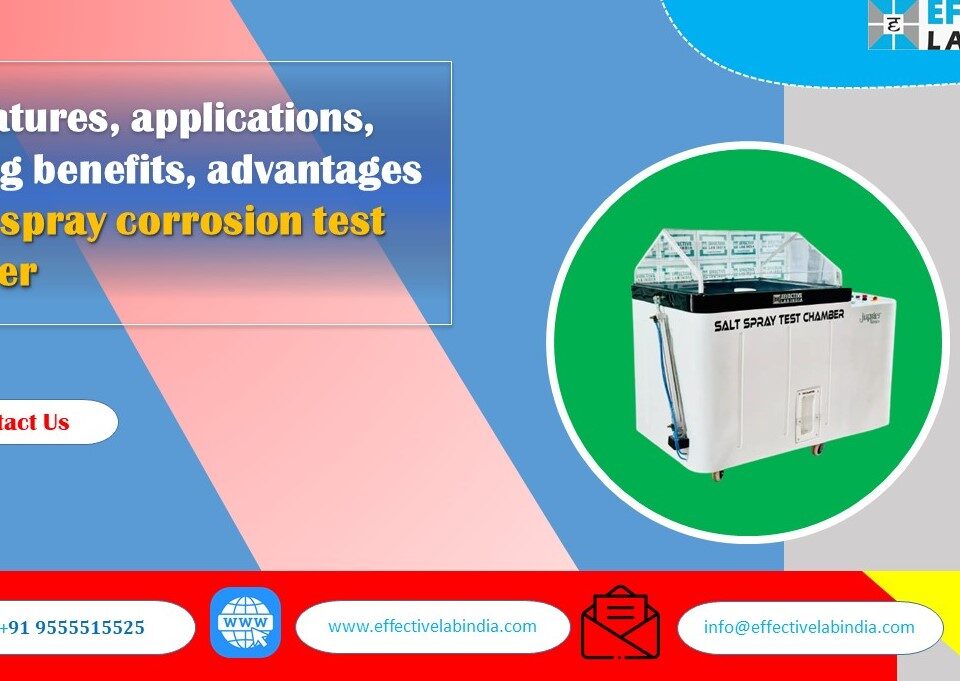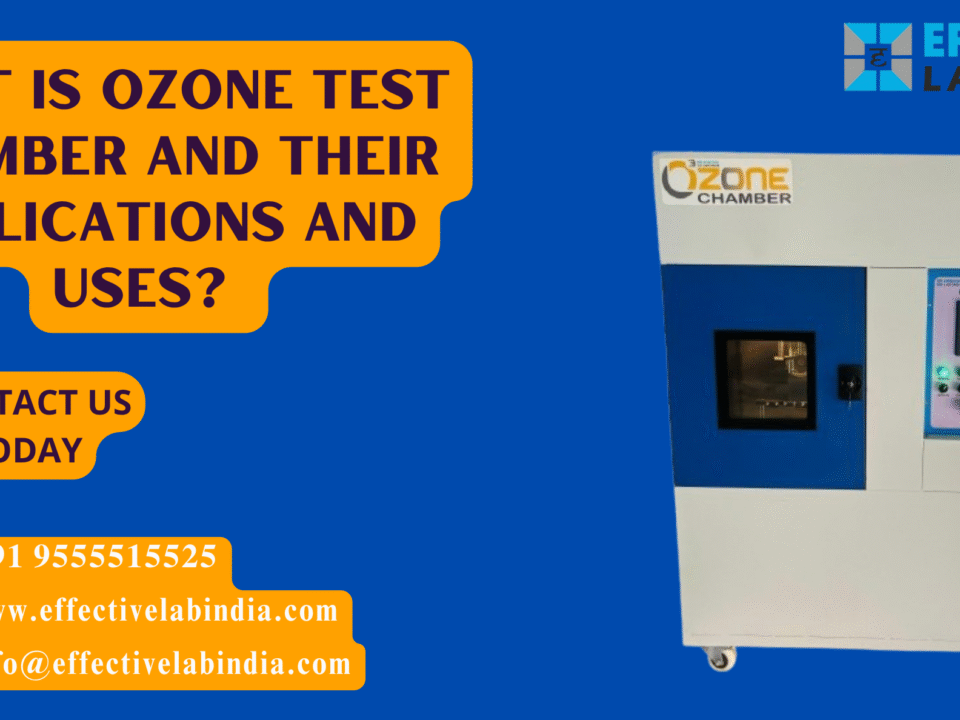
UV Light Accelerated Weathering Tester Working Principle In Detail
February 19, 2025
Effective Lab India Ozone Test Chamber Review Features, Price & Performance
February 22, 2025When evaluating the flexibility of a material for external influences and long life, a corrosion test is important. A salt spray test is one of the most commonly used techniques for rust testing using a testing instrument named a salt spray test chamber. This test considers the ability to meet rust under controlled conditions for a material or coating.
Among the different salt spray test methods, three major variants exist:
- Neutral salt spray (NSS) test
- Eddixic Salt Spray (AASS) Test
- Copper-Accelerated Salts Spray (CASS) Testing
Each test provides a unique purpose and is used on different materials. In this article, we will compare NSS, AASS and CASS tests regarding procedures, applications and benefits.
1. Understanding the Salt Spray Test Method (Procedure)
The salt spray test process involves placing test samples inside a salt spray chamber where they are exposed to an atmosphere containing a salt-laden environment. This quick test method simulates the real conditions to estimate how a material will work over time.
1.1 Importance of Salt Spray Testing
- Material predicts a long life
- Help in selecting a corrosion-resistant coating
- The industry ensures compliance with standards
- AIDS in product development and quality control
1.2 Role of a Salt Spray Test Chamber
A salty spray test chamber is an enclosed testing instrument that controls factors such as temperature, moisture and salt concentration. Effective Lab India salt spray test chamber manufacturer designs these units according to international standards such as ASTM B117 and ISO 9227.
2. Neutral Salt Spray (NSS) Test
The NSS test is the most widely used salt spray test and acts as a measure of corrosion resistance evaluation.
2.1 NSS Test Procedure
- A 5% sodium chloride (NaCl) solution is produced and sprayed as a fine mist inside the chamber.
- The chamber maintains a temperature of 35°C (95°F).
- The duration of the test varies depending on the material and coating.
2.2 Applications of NSS Test
- Ideal for testing metals, coatings and alloys.
- Used to evaluate zinc-coated and painted materials.
- Commonly applied in automotive, aerospace, and construction industries.
2.3 Advantages of NSS Test
✔ Simple and widely recognized test method
✔ Cost -effective and easy to carry out
✔ Suitable for a wide range of materials
3. Acetic Acid Salt Spray (AASS) Test
The AASS test is a modified version of the NSS test that includes acetic acid to accelerate the corrosion process.
3.1 AASS Test Procedure
- A standard NSS test is performed with the addition of acetic acid (CH₃COOH) for saline.
- The pH value for the solution is adjusted from 3.1 to 3.3.
- The temperature is kept at 35 °C (95 °F).
3.2 Applications of AASS Test
- Usually used to test decorative coatings.
- Ideal for plating nickel-chromium on steel or zinc.
- Found in industries such as electronics, consumables goods and jewellery.
3.3 Advantages of the AASS Test
✔ Faster corrosion rate compared to NSS
✔ Ideal for testing the material coated with a decorative finish
✔ More realistic for certain atmospheric conditions
4. Copper-Accelerated Acetic Acid Salt Spray (CASS) Test
The CASS test is an even more aggressive corrosion test, specially designed for the evaluation of high-performance coatings.
4.1 CASS Test Procedure
- Acetic acid is added to NSS testing, as well as copper chloride (CuCl₂).
- PH is adjusted from 3.1 to 3.3.
- The temperature is kept at 50 °C (122 °F).
4.2 Applications of CASS Test
- Usually used for anodized aluminium, car parts and aerospace coatings.
- Evaluates the durability of chromium plating and powder coatings.
- Found in the marine and industrial environment.
4.3 Advantages of the CASS Test
✔Very fast corrosion simulation
✔ Extremely effective for testing durable coating
✔ Provides a realistic assessment of marine and strict environments
5. Comparison of NSS, AASS, and CASS Tests
| Test Type | Solution Composition | pH Level | Temperature | Common Applications |
| NSS | 5% NaCl | ~6.5-7.2 | 35°C | General metal coatings, automotive, aerospace |
| AASS | 5% NaCl + Acetic Acid | 3.1-3.3 | 35°C | Decorative coatings, jewellery, consumer goods |
| CASS | 5% NaCl + Acetic Acid + Copper Chloride | 3.1-3.3 | 50°C | Aerospace, anodized aluminium, marine industry |
6. Choosing the Right Salt Spray Test for Your Needs
The range of a salt spray test depends on this:
- Material type – NSS for material fundamental coating, AASS for a decorative finish, and CASS for high-status coating.
- Industry requirements – CASS in favour of automotive and aerospace, while decorative things use AASS.
- Environmental exposure – Leaning environment requires CASS, while coating indoor use may require NSS
Conclusion
A salt spray test is required to evaluate the corrosion resistance of different coatings and materials. NSS, ASS and CASS tests serve a unique purpose, from standard tests to aggressive corrosion simulation. Understanding these differences helps industries choose the right test method to ensure long-term content performance.
FAQs
1. Which salt spray test is the most aggressive?
The CASS test is the most aggressive, as it includes acetic acid and copper chloride, accelerating corrosion significantly.
2. What is the standard duration for a salt spray test?
The duration varies but typically ranges from 24 to 1000+ hours, depending on the material and industry standards.
3. Can a salt spray chamber simulate real-world corrosion?
While it provides an accelerated assessment, real-world conditions involve more complex factors like temperature fluctuations and humidity.
4. What industries use the AASS test?
The AASS test is commonly used in electronics, jewellery, and consumer product industries for evaluating decorative coatings.
5. How do I choose a salt spray test chamber manufacturer?
Look for reliable manufacturers that meet industry standards like ASTM B117 and provide customizable test chambers.




